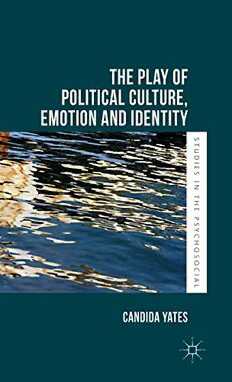
The Play of Political Culture, Emotion and Identity PDF
Preview The Play of Political Culture, Emotion and Identity
StudiesinthePsychosocialSeries Editedby PeterRedman,TheOpenUniversity,UK StephenFrosh,CentreforPsychosocialStudies,BirkbeckCollege,Universityof London,UK WendyHollway,TheOpenUniversity,UK Titlesinclude: StephenFrosh HAUNTINGS:PSYCHOANALYSISANDGHOSTLYTRANSMISSIONS UriHadar PSYCHOANALYSISANDSOCIALINVOLVEMENT InterpretationandAction MargaritaPalacios RADICALSOCIALITY StudiesonViolence,DisobedienceandtheVicissitudesofBelonging DerekHook (POST)APARTHEIDCONDITIONS GarthStevens,NormanDuncanandDerekHook(editors) RACE,MEMORYANDTHEAPARTHEIDARCHIVE TowardsaTransformativePsychosocialPraxis IreneBrunaSeu PASSIVITYGENERATION HumanRightsandEverydayMorality LynnChancerandJohnAndrews(editors) THEUNHAPPYDIVORCEOFSOCIOLOGYANDPSYCHOANALYSIS KateKennyandMariannaFotaki(editors) THEPSYCHOSOCIALANDORGANIZATIONSTUDIES AffectatWork JamesS.Ormrod FANTASYANDSOCIALMOVEMENTS JoWhitehouse-Hart PSYCHOSOCIALEXPLORATIONSOFFILMANDTELEVISIONVIEWING OrdinaryAudience BülentSomay THEPSYCHOPOLITICSOFTHEORIENTALFATHER BetweenOmnipotenceandEmasculation JulieWalsh NARCISSISMANDITSDISCONTENTS WendyHollway KNOWINGMOTHERS ResearchingMaternalIdentityChange StephenFrosh PSYCHOSOCIALIMAGINARIES PerspectivesonTemporality,SubjectivitiesandActivism CandidaYates THEPLAYOFPOLITICALCULTURE,EMOTIONANDIDENTITY StudiesinthePsychosocialSeries SeriesStandingOrderISBN978–0–230–30858–9(hardback) 978–0–230–30859–6(paperback) (outsideNorthAmericaonly) You can receive future titles in this series as they are published by placing a standing order. Please contact your bookseller or, in case of difficulty, write to usattheaddressbelowwithyournameandaddress,thetitleoftheseriesand theISBNsquotedabove. Customer Services Department, Macmillan Distribution Ltd, Houndmills, Basingstoke,HampshireRG216XS,England The Play of Political Culture, Emotion and Identity Candida Yates ProfessorofCultureandCommunication,BournemouthUniversity,UK ©CandidaYates2015 Allrightsreserved.Noreproduction,copyortransmissionofthis publicationmaybemadewithoutwrittenpermission. Noportionofthispublicationmaybereproduced,copiedortransmitted savewithwrittenpermissionorinaccordancewiththeprovisionsofthe Copyright,DesignsandPatentsAct1988,orunderthetermsofanylicence permittinglimitedcopyingissuedbytheCopyrightLicensingAgency, SaffronHouse,6–10KirbyStreet,LondonEC1N8TS. Anypersonwhodoesanyunauthorizedactinrelationtothispublication maybeliabletocriminalprosecutionandcivilclaimsfordamages. Theauthorhasassertedherrighttobeidentifiedastheauthorofthiswork inaccordancewiththeCopyright,DesignsandPatentsAct1988. Firstpublished2015by PALGRAVEMACMILLAN PalgraveMacmillanintheUKisanimprintofMacmillanPublishersLimited, registeredinEngland,companynumber785998,ofHoundmills,Basingstoke, HampshireRG216XS. PalgraveMacmillanintheUSisadivisionofStMartin’sPressLLC, 175FifthAvenue,NewYork,NY10010. PalgraveMacmillanistheglobalacademicimprintoftheabovecompanies andhascompaniesandrepresentativesthroughouttheworld. Palgrave®andMacmillan®areregisteredtrademarksintheUnitedStates, theUnitedKingdom,Europeandothercountries. ISBN978–0–230–30252–5 Thisbookisprintedonpapersuitableforrecyclingandmadefromfully managedandsustainedforestsources.Logging,pulpingandmanufacturing processesareexpectedtoconformtotheenvironmentalregulationsofthe countryoforigin. AcataloguerecordforthisbookisavailablefromtheBritishLibrary. AcatalogrecordforthisbookisavailablefromtheLibraryofCongress. Contents Acknowledgements vi 1 IntroducingEmotion,IdentityandthePlayofPolitical Culture 1 2 SpinningtheUnconsciousandthePlayofFlirtation inPoliticalCulture 22 3 TheDilemmasofPostfeminismandtheFantasiesof PoliticalCulture 47 4 PoliticalCultureandtheDesireforEmotionalWellbeing 64 5 TheAbsentParentinPoliticalCulture 86 6 MovingForwardtothePast:FantasiesofNationwithin UKPoliticalCulture 105 7 ReflectionsonthePsycho-CulturalDynamicsofPolitical Culture 127 Notes 141 References 155 Index 190 v Acknowledgements This book was written with the encouragement and support of colleagues, friends, family and institutions. I began writing this book attheUniversityofEastLondon(UEL),whereIspentmanyyearswork- ing in the Psychosocial Studies subject area, housed in various schools and finally in the School of Social Sciences. I am grateful to UEL for all the support that it has given me over the years and I want to thank the many colleagues and friends at UEL who have encouraged me to write this book and especially, the staff team and students on the UEL Psychosocial Studies programme. Special thanks go to David Jones, Corinne Squire, Heather Price, Nicola Diamond, Darren Ellis, AngieVoela,LurraineJones,CigdemEsin,BethanyMorganBrett,Helen Powell, Siobhan Lennon-Patience, Jacob Johanssen, Julia Dane, Robin Stinson,AndrewCalcuttandGiorgiaDona.Particularthanksgotothose friendsandcolleagueswhohavereaddraftchapters,includingCaroline Bainbridge, Helen Powell, Mastoureh Fathi and the Palgrave reviewer, who provided such helpful feedback. I would also like to thank and acknowledge other friends and colleagues as supporting and encourag- ingmeonmyjourneyasanacademicandresearcherincluding,Michael Rustin, Lynne Layton, Shelley Day Sclater, Susan Greenberg, Heather Nunn,AnitaBiressi,DeborahJermyn,AndrewBlake,MartaRabikowska, IainMacRury,BarryRichardsandJoanneBrown. This book began its life during the period of the AHRC Funding for the Media and Inner World (MiW) research network, which I set up withCarolineBainbridgeatTheUniversityofRoehamptoninorderto develop a new Psycho-Cultural field of enquiry. Many of the ideas in this book were developed at MiW events and through its publications. A number of colleagues and friends associated with MiW have been influentialinshapingmyideasforthisbook,includingBrettKahr,Carol LeaderandMichaelMaynardandalsocolleaguesattheFreudMuseum, includingIvanWardandCarolSeigel.ThanksalsotoDavidAaronovitch and Dan Chambers for their thoughts on Boris Johnson and the emo- tional theatre of politics more generally. My dear friend and research partner Caroline Bainbridge deserves special thanks and acknowledge- mentandIremainverygratefultoCarolineforherever-presentsupport andinsightandalsoforsharingherwitandfabuloussenseofhumour whenneeded! vi Acknowledgements vii I completed the book in my new institution, Bournemouth Univer- sity,andIamgratefultomynewcolleaguesintheFacultyofMediaand CommunicationandintheCMCgroupfortheverywarmwelcomethat I have received and also for encouraging me to finish the manuscript. My thanks go to Stephen Jukes, Richard Scullion, Barry Richards, Iain MacRury,HeatherSavigny,DarrenLilleker,PawelSurowiec,LauraBunt- MacRury,ShelleyThompson,RebeccaJenkinsandJaniceDenegri-Knott, who have all been very supportive in this regard. I also want to thank Irene Eskanazi and John Biggs for their kindness in welcoming me to theirhomeatBournemouth. I would also like to thank photographer and Bournemouth Univer- sitycolleague,Rutherfordforkindlyprovidingtheimageforthisbook. Thanks also to the editors at Palgrave Macmillan, Nicola Jones, Libby Forrest, Eleanor Christie and the project manager, Francis Arumugam, for their patience and kind support in helping me to complete and finalise the manuscript. Some parts of this book have been published elsewhere, and I want to acknowledge and thank those journals and their editors. Parts of Chapter 3 have been published previously in Subjectivity, 2010, Vol. 3, no. 3: 282–302; and parts of Chapter 5 have been published in Psychoanalysis, Culture & Society, 2012, Vol. 17, no. 2: 204–221. Parts of Chapter 4 have also been published in Free Associations,2011,no.62:59–84. Finally,Iwanttothankmyfamilyfortheirencouragementandsup- port, including Dagan Wells and Elpida Fragouli; Lily and Alexander Wells; Julian Wells and Vicky Yanoula; Miranda, Dermot, Daisy and OonaghMadden-Wells;Nikki,EdandWoodyCimaandStella,Camilla and Clio Yates. I am very grateful to my uncle, David Gladstone (and mywonderfulaunt,thelateAprilGladstone),whohaveencouragedme andlistenedenthusiasticallytomyideasovertheyears.Hugethanksgo to my sisters, Cary and Clare, and their partners Bee and Simon, and also to my brother, Christo, and my nephews Toby, Max, Harry and Michael.Ialsowanttothankmyfather,MichaelYates,forhiscontinual enthusiasmandencouragementandforbeingsoproudofwhatIdo! Last,butnotleast,mythanksgotoLindsayWells,whohasnowseen methroughanotherbook,anditisdedicatedtohimwithmuchlove. This page intentionally left blank 1 Introducing Emotion, Identity and the Play of Political Culture Developingapsycho-culturalapproachtoemotion andpoliticalculture This book explores the relationships between emotion, identity and fantasy within the mediatised landscape of contemporary political culture.FocusingmainlyontheUKcontext,thestudyoftheserelation- ships takes the form of an interdisciplinary ‘psycho-cultural’ approach that uses theories and methods taken from the fields of psychosocial studies, cultural and media studies. A starting place for this book is that politics – and our engagement with it – has become increasingly emotional(Lilleker,2012;Richards,2007).Theemotionalisationofpol- iticscanbefoundindifferentaspectsofpoliticalculture,whichinclude the field of political representation, the content of political policy and theengagementwiththoserepresentationsandpolicieswithinandvia differentaspectsofthemediaandpopularculture. Onecancitenumerousimagesofpoliticiansperformingemotivelyfor thecamera–fromTonyBlair’sspeechfollowingPrincessDiana’sdeath in1997,toHillaryClinton’stearsonher2008electioncampaign,orthe formerAustralianPrimeMinisterKevinRudd’stearfulretirementspeech in2013.TheUKgovernment’sfocusonnotionsof‘emotionalwellbeing’ and‘happiness’alsoprovidesanexampleofthewayinwhichthelan- guageanddiscoursesofemotionhavepermeatedthepoliticaldiscourses of public life (Lennon-Patience, 2013; Richards, 2007; Rustin, 2007; Yates, 2011). As I discuss, the study of emotions in this context needs toincludeafocusonnotionsoffantasy,affectandtheunconsciousand the psychological defences and anxieties that are stirred up, commu- nicated and experienced within the day-to-day mediatised contexts of politicalculture. 1
